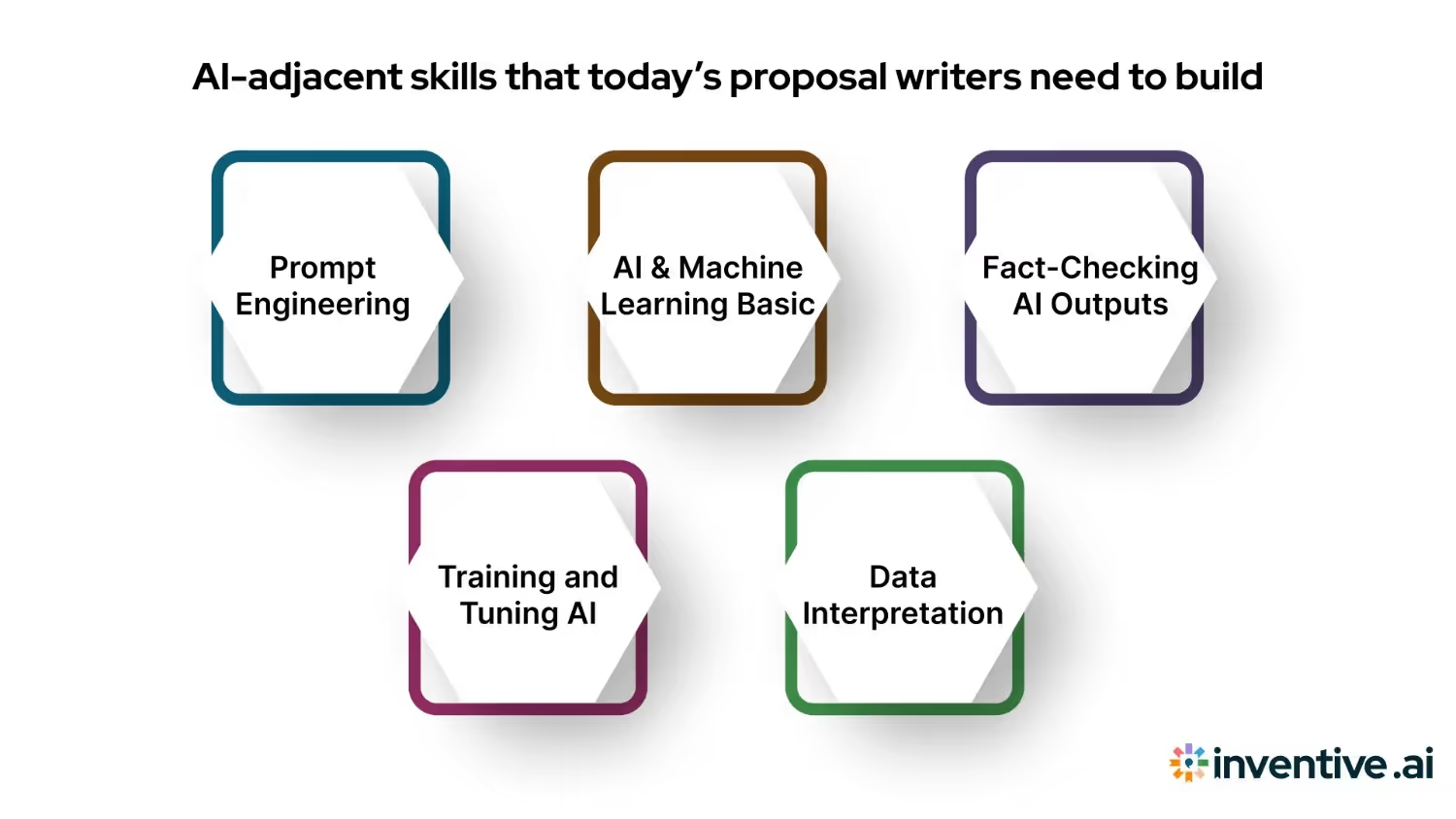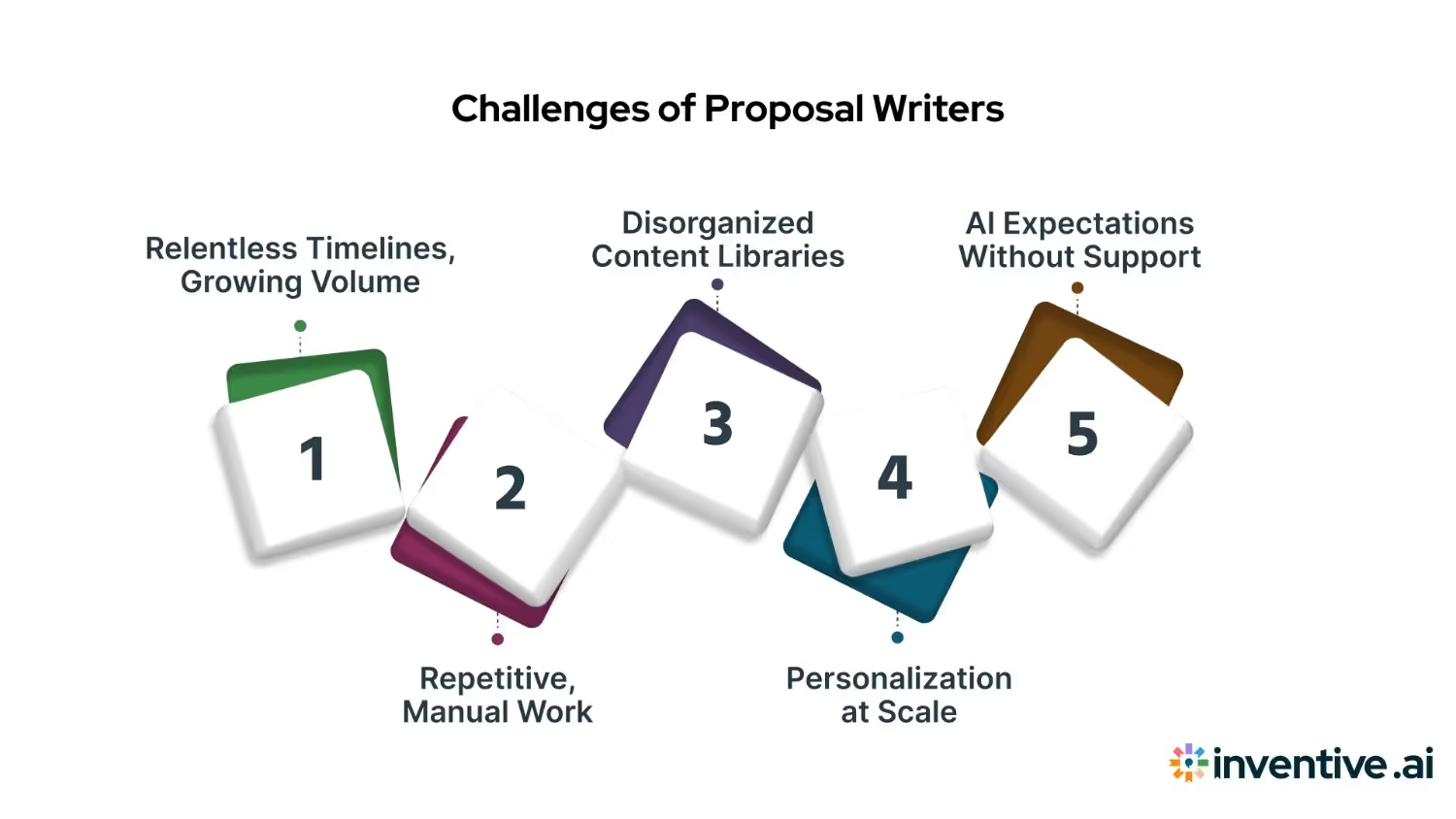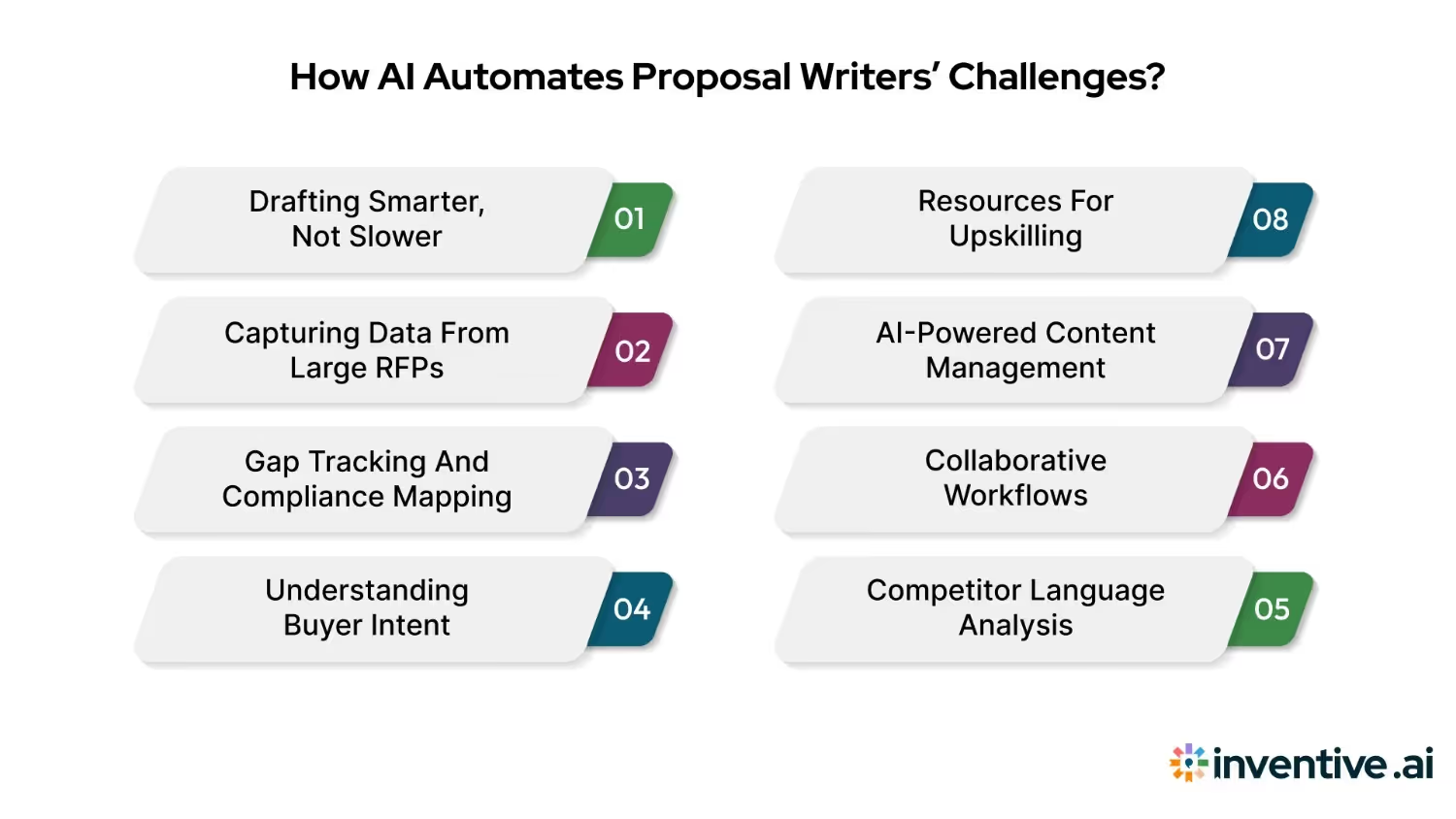Proposal Writer Job Description and Key Responsibilities
Explore a proposal writer job description highlighting key responsibilities, such as crafting persuasive documents and collaborating with teams.

If you're drawn to the idea of winning work through words, the role of a proposal writer might be worth exploring.
The average salary in the U.S. sits at $78,604 per year, but what makes the job compelling goes well beyond pay. Proposal writers work at the intersection of strategic messaging, technical accuracy, and meeting deadlines for project delivery.
The biggest shift? AI is no longer optional. Most RFP teams now expect writers to work fluently with AI tools to accelerate bid turnaround without sacrificing quality.
In this blog, you’ll learn what modern proposal teams look for, which AI skills are most in demand, and how today’s proposal writers can use tools like content automation, clause mapping, and compliance parsing to stay competitive.
Whether you're stepping into the field or redefining your role, this guide will show you what it takes to succeed in the AI-enabled proposal landscape.
TL;DR
- Proposal writing is one of the most lucrative and strategic roles in business development.
- Core responsibilities include decoding complex RFPs, managing submissions, and writing persuasive content under pressure.
- Writers operate in high-stakes environments where precision, collaboration, and speed all matter.
- Success in proposal writing now depends on sharpening AI skills alongside interpersonal and project management expertise.
- AI tools can automate drafting, compliance checks, and content reuse, but only if writers know how to train and apply them correctly.
What Is a Bid Writer?
A bid writer, also known as a proposal writer, is responsible for creating persuasive, well-structured responses to Requests for Proposals (RFPs), tenders, or bids issued by clients, especially in competitive B2B and government sectors.
Their primary goal is to translate an organization’s capabilities into written proposals that meet the buyer’s stated requirements while clearly communicating value, compliance, and differentiation.
While titles may vary, the core responsibility remains the same: producing high-quality written responses that improve the company’s chances of winning contracts.
The Role of a Proposal Writer
Proposal writers work closely with capture managers, subject matter experts, and sales leads to turn raw input into clear, client-focused responses.
Their day-to-day responsibilities extend well beyond writing. A typical cycle involves gathering input from subject matter experts, reviewing past proposals, interpreting buyer language, and shaping content that reflects both compliance and competitive positioning.
In many organizations, the role also involves maintaining content libraries, identifying reusable materials, and collaborating with tools to reduce repetition and expedite the drafting process.
It’s a role that demands focus, adaptability, and strong editorial judgment, especially in fast-moving bid environments.
As a proposal writer, you are responsible for more than drafting a proposal. A typical proposal Writer job description goes like this:
- Rewrite and edit proposal responses from a variety of stakeholders, typically across sales, marketing, product, finance, legal, and delivery.
- Customize RFP responses using an internal proposal content library, tailoring them to address client-specific needs and hot buttons.
- Ensure brand alignment by applying defined voice and tone across all written content, including executive summaries and cover letters.
- Lead and participate in storyboarding sessions, kick-off calls, and strategy discussions to define win themes and response structure.
- Verify compliance with customer requirements, marking schemes, and evaluation criteria.
- Coach SMEs and contributors on writing best practices and review/edit their contributions for clarity and consistency.
- Conduct light market or client research to align responses with buyer expectations and context.
- Tag and archive reusable content for future proposals, contributing to the content library or knowledge base.
These responsibilities reflect the reality of the role: It’s a high-stakes, high-collaboration role that demands both precision and persuasion.
To successfully address these meticulous job responsibilities, you need a combination of skills. Writing is only one part of the role, but there are other critical skills every proposal writer must develop to stay effective, especially in the age of AI, where your skill is challenged to the limit.
Let’s explore the key skills that matter most in today’s AI-driven proposal environment.
The Skills of a Proposal Writer in the Age of AI
A proposal writer requires a blend of technical, creative, and interpersonal skills to succeed. Writing remains the cornerstone; you must be able to craft responses that are clear, concise, and compelling. Editing and proofreading are equally vital, especially under deadline pressure.
Research is another foundational skill. Writers must gather intelligence about the client, opportunity, and competitors, and organize that data into persuasive arguments.
Communication is also essential in interviewing subject matter experts, clarifying technical inputs, and aligning internal stakeholders, all of which require clarity and coordination.
But in the current RFP environment, these fundamentals aren’t enough.
The RFP industry has moved decisively toward AI adoption. Many teams now use AI-enhanced platforms to manage content libraries, generate first drafts, and streamline complex workflows.
In fact, 92% of companies plan to increase AI investment over the next three years. For RFP teams, this shift translates to rising expectations: proposal writers aren’t just expected to navigate AI-enabled workflows, extract insights from automated tools, and contribute to smarter, faster responses.
This means a modern proposal writer also needs AI fluency, not just to stay relevant, but to work effectively in AI-augmented teams.

Here are key AI-adjacent skills that today’s proposal writers need to build:
- Prompt Engineering: The ability to write precise, goal-oriented prompts that produce high-quality AI outputs. This is essential when working with AI tools that generate content, summarize documents, or extract key information from RFPs.
- AI & Machine Learning Basics: You don’t need to become a data scientist, but understanding how NLP models, supervised learning, and generative tools work will help you judge output quality, flag inaccuracies, and make better use of AI-powered platforms.
- Fact-Checking AI Outputs: Since AI tools can generate plausible but incorrect responses, you must develop a fact-checking reflex. Cross-checking citations, verifying claims, and spotting hallucinated content will become a daily necessity.
- Training and Tuning AI Models: If your team uses custom AI tools (like proposal content assistants or knowledge bases), you may be involved in feeding them with relevant data or refining model behavior based on feedback loops.
- Data Interpretation: Proposal writers are increasingly relying on dashboards and analytics to assess bid/no-bid decisions, content performance, and customer scoring. Knowing how to interpret this data strengthens your strategic input during pursuit planning.
In short, your skillset now spans both the human art of persuasion and the technical ability to collaborate with AI. This dual capability is what sets high-performing proposal writers apart today.
Salary Insights for Proposal Writers and Bid Managers
If you’re considering a career in proposal writing, it helps to know the financial prospects. Based on Glassdoor data:
- Proposal Writer: $75K–$122K per year
- Proposal Manager / Bid Manager: $89K–$149K per year
These ranges reflect both entry-level and experienced professionals, showing the potential growth in compensation as you gain expertise and take on more strategic responsibilities.
With a clear view of the earning potential, it’s equally important to understand how your career can progress in proposal writing. Here’s how your career path typically unfolds, from entry-level roles to senior management positions.
Career Path of a Proposal Writer
A career in proposal writing offers structured growth opportunities, rewarding both skill development and strategic thinking. Understanding the typical trajectory helps aspiring writers see long-term potential and plan their learning, including AI and interpersonal skills.
This is how your career path will look if you are considering proposal writing as a profession
- Junior Proposal Writer: This is the entry-level role you get if you are joining as a fresher. You’ll primarily focus on research, gathering content, and assisting senior writers. It’s the stage to learn the fundamentals: understanding proposal structures, reading client requirements carefully, and getting familiar with compliance basics. You’ll also start experimenting with AI tools for drafting and formatting content.
- Proposal Writer: Once you’ve shown your potential in a junior role, you step into a full-fledged proposal writer position. Here, you take ownership of entire sections or small proposals, draft responses, and ensure that the content aligns with the client’s needs. This role sharpens your persuasive writing, storytelling, and efficiency with AI-powered writing assistants, giving you more creative control over proposals.
- Senior Proposal Writer: This role continues your journey, where you lead sections or even full proposals, mentor junior writers, and refine client-specific strategies. You’ll combine advanced storytelling, stakeholder management, and AI integration to produce high-quality, tailored proposals efficiently.
- Bid Manager / Proposal Manager: At this stage, you oversee the entire proposal process. You coordinate teams, manage deadlines, and ensure that submissions meet high standards. Leadership skills, process optimization, and AI-powered automation become critical to streamline workflows and improve win rates.
- Head of Proposals /Director of Proposals: This is a strategic role where you set proposal direction, align submissions with business objectives, and build frameworks for success across accounts. You’ll lead teams, mentor the next generation of writers, and leverage AI to drive innovation and efficiency in high-stakes proposals.
While the career path for proposal writers offers growth and attractive opportunities, it also comes with unique challenges that require skill, strategy, and adaptability to navigate successfully.
Challenges of Proposal Writers

Bid writers today are under more pressure than ever. Expectations are rising, but support systems haven’t kept pace. Here are some of the core challenges they face:
- Relentless Timelines, Growing Volume: Teams are expected to respond to more bids, often with less time. Short deadlines leave little room for strategy, iteration, or quality control.
- Repetitive, Manual Work: Despite advances in tooling, many bid writers still spend hours on low-value tasks like copy-pasting boilerplate, formatting tables, and tracking clauses across sections. It’s draining and error-prone.
- Outdated or Disorganized Content Libraries: Finding the right reference answer should be instant. But content libraries often lag behind current messaging, lack structure, or become bloated with duplicates. This slows down first draft creation and increases risk.
- Personalization at Scale: Buyers expect tailored responses, but scaling personalization across multiple bids without a robust system is difficult. Writers are forced to choose between speed and relevance.
- AI Expectations Without Support: RFP teams are adopting AI, but many bid writers haven’t been formally trained. They’re expected to use AI tools fluently, generating content, managing prompts, reviewing outputs, all while maintaining quality. The gap between expectation and enablement is widening.
These challenges are part of almost any modern job, not just proposal writing. But the same world that created these pressures also offers tools to manage them. Among them, no tool is as transformative as AI when it comes to helping proposal writers navigate complexity, reduce repetition, and work at scale.
Let’s explore how it tackles the writer’s most significant bottlenecks.
How AI Automates Proposal Writers’ Challenges

You’ll often hear people say that AI is here to replace writers. In reality, it’s augmenting them, especially in proposal teams. The most significant gain isn’t creativity; it’s time. AI automates the most tedious aspects of writing, including formatting, clause hunting, and reworking boilerplate content.
And the industry isn’t just dealing with generative AI anymore. We’ve moved into the era of AI agents, especially in the RFP world. These agents go far beyond copy generation. They help you manage content, extract insights, analyze competitors, and even collaborate across teams. McKinsey estimates that current generative technologies can automate up to 70% of the average employee’s work time. For proposal writers, that’s no longer hypothetical.
Here’s how AI can now fit into every stage of the proposal writing process:
Drafting Smarter, Not Slower
AI RFP tools don’t just write. They integrate with your knowledge base to surface approved responses, reuse past material intelligently, and adjust language to match each buyer’s tone. This allows writers to focus on nuance and positioning rather than recreating standard responses.
Capturing Data from Large RFPs
Manual review of 200-page RFPs slows down any team. AI tools can extract obligations, scoring rubrics, and submission instructions from scattered sections. This reduces missed requirements and frees up time for strategic messaging.
Gap Tracking and Compliance Mapping
Instead of tracking requirements in spreadsheets, AI can highlight missing content areas based on the RFP’s structure and your past submissions. It flags compliance risks early, before reviewers do.
Understanding Buyer Intent
AI can compare similar past bids from the same buyer to spot themes, decision drivers, and language cues. This helps proposal writers tailor messaging that aligns with the buyer’s known preferences and pain points.
Competitor Language Analysis
Modern tools can analyze public competitor bids or past award notices to surface language patterns and value propositions that have previously won. Writers can then shape their messaging to differentiate more effectively.
Collaborative Workflows
Some AI tools are built to support distributed teams. Writers, SMEs, and reviewers can work in parallel, with the AI agent assigning sections, tracking changes, and offering inline suggestions based on shared standards.
AI-Powered Content Management
Keeping a content library up to date is a job in itself. AI agents can flag stale content, suggest updates based on new RFPs, and even rewrite boilerplate to match new compliance requirements.
If you're serious about growing as a proposal writer, start by using the same tools that are reshaping the rest of your team’s workflow. AI won’t do the writing for you, but it will cut the noise, handle the grunt work, and give you more time to think, adapt, and write smarter. Use it to sharpen your edge, not blunt your role. The expectations are higher now, and the only way to meet them is to match your craft with the tools built for today’s pace.
Resources for Upskilling
If you want to stay relevant as a proposal writer, you’ll need more than writing chops; you’ll need a working fluency in AI, tools, and modern bid processes. Start with platforms like LinkedIn Learning and Coursera, where you’ll find practical courses on AI for business writing, automation in proposal management, and even prompt engineering. These aren’t just theoretical; they’re designed for working professionals looking to apply AI on the job.
You should also consider joining the Association of Proposal Management Professionals (APMP). It’s one of the best places to sharpen your understanding of the end-to-end proposal process and connect with peers facing the same pressures. Between their webinars, certifications, and discussion forums, APMP helps you build both expertise and community.
Pair that with AI upskilling, and you’ll be better equipped to write faster, collaborate better, and respond smarter.
The Modern Proposal Writer’s Toolkit
Proposal writers today work best when they combine personal expertise with technology that accelerates and strengthens their work. A well-rounded toolkit typically includes the following categories:
AI-Powered Writing Assistants
Tools like Jasper and GPT models act as smart drafting partners. They work best when you set the scene with context: share the client’s priorities, your differentiators, and the tone you need. Instead of vague output, you get text aligned to your bid strategy.
The real strength is in reframing. A single generic answer won’t win, but a writing assistant can adapt one draft into multiple tailored responses: emphasizing cost efficiency for one prospect, compliance strength for another, and innovation for a third. You move faster through first drafts, while keeping your energy focused on sharpening persuasion and storytelling.
Grammar and Clarity Checkers
Basic spelling checks are table stakes, but tools like Grammarly Business and ProWritingAid take it a step further by enhancing readability and clarity. For proposal teams, this matters because evaluators often scan documents quickly under time pressure. A tool that trims complex sentences, flags jargon, and suggests active voice ensures your content is both professional and instantly digestible.
Proposal Automation Platforms
End-to-end automation solutions, such as Inventive AI, automate repetitive tasks within the RFP workflow, including importing questionnaires, mapping requirements, and suggesting pre-filled responses.
The RFP platforms’ strength lies in freeing you to spend more time on strategic answers and win themes. Instead of chasing formatting or hunting for standard clauses, you can channel effort into refining executive summaries, case studies, and differentiators.
Combined with writing assistants, these platforms let you strike the right balance: automation handles the mechanics, you handle the persuasion.
How Inventive AI Supports Proposal Writers

Inventive AI is designed for individuals who work within RFPs, particularly writers facing constant pressure to draft more efficiently, effectively, and with fewer revisions. Whether you're stuck researching customer background, tweaking tone, or managing outdated content, Inventive AI turns those bottlenecks into repeatable wins. Here’s how:
- Automated Answers: Generate high-quality draft responses with a single click. Cuts down manual writing time while maintaining oversight, so your team can respond faster without sacrificing quality.
- AI-Powered Responses with Citations and Confidence Scores: Know exactly where the AI’s answer comes from and how reliable it is, perfect for regulated industries or teams that need traceable inputs. Builds trust in AI-generated content by backing it with verifiable sources, critical for audits, compliance, and stakeholder confidence.
- Knowledge Hub: Access all your best answers in one place. No more hunting through folders or past RFPs, your approved content is ready to use and always up to date. This ensures quick access to pre-approved, high-quality content, reducing delays and inconsistencies across responses.
- AI Content Manager: Prevents outdated or risky content from slipping into submissions, protecting your brand and legal standing.
- AI Context Engine: Brings in deal-specific context from RFPs, internal notes, sales calls, and research, so the AI writes with purpose, not just pattern. Makes responses more relevant by integrating deal-specific context, increasing your chances of resonating with evaluators.
- Tone & Style Control: Tailor the voice, length, and formality of every response to match your team’s writing guide or the buyer’s preferred tone. Delivers polished, buyer-aligned responses that reflect your brand voice, increasing professionalism and engagement.
- Competitor Research Agent: Surfaces insights on competitor messaging, pricing, and positioning, helping you counter objections and differentiate without guesswork. This equips teams with actionable intel to counter objections and differentiate without wasting time on external research.
- Customer Research Agent: Summarizes customer background, priorities, and language from public and internal sources, so your responses sound like you’ve done the homework. Improves response relevance by tailoring content to customer priorities, helping you stand out in crowded evaluations.
- Collaboration Tools: Assign tasks, manage SME input, and capture feedback directly inside the workspace, no more scattered comments or missed updates. This streamlines SME input and team feedback in one place, so proposals move faster with fewer communication gaps.
- Role-Based Access & Review Logs: Keep version history, manage access by role, and streamline legal or exec reviews without bottlenecks. Enables controlled collaboration and audit trails for compliance-heavy or multi-reviewer environments.
- RFP Intelligence Agent: Parses RFPs instantly and extracts requirements into a structured format, liminating manual parsing with structured requirement extraction, so teams can start strategizing sooner.
- 10x Faster Drafts: Accelerates the full proposal lifecycle, giving teams more time to focus on strategy, differentiation, and winning.
See How Teams Cut RFP Time by 90% and Boosted Win Rates by 50%
Conclusion: A New Era for Proposal Writers
The role of a proposal writer is evolving, from passive scribe to strategic contributor. Writers who develop skills in research synthesis, positioning, and narrative structure will remain essential in this AI-powered landscape.
But the best opportunities now lie in combining human judgment with intelligent systems. If you're ready to elevate your role, sharpen your skills, and work at the pace modern deals demand, Inventive AI’s AI RFP Agent is built to help you do just that. Book a demo today.
FAQs
1. Will AI replace proposal writers?
No. AI assists writers by handling repetitive tasks like formatting, first drafts, and data extraction. The writer’s judgment, strategy, and persuasive skills are still critical—AI just speeds up the groundwork.
2. What skills should proposal writers focus on in an AI-driven environment?
Writers should focus on strategic thinking, narrative structure, understanding buyer psychology, and working alongside AI systems. Knowing how to guide, critique, and refine AI output is now a valuable part of the job.
3. Can AI write entire RFP responses accurately?
Not reliably without human oversight. AI can draft based on past content and known facts, but human review is essential to ensure accuracy, compliance, and brand alignment.
4. How does Inventive AI help with version control and collaboration?
It centralizes approved content, tracks review logs, and supports role-based access—so writers, SMEs, and reviewers stay aligned even on fast-moving bids.
5. Is it hard to learn how to use an AI RFP tool like Inventive AI?
No. Tools like Inventive AI are built for writers, not engineers. Most users can start drafting with AI and collaborating with teams in just a few days of onboarding.

90% Faster RFPs. 50% More Wins. Watch a 2-Minute Demo.
After witnessing the gap between generic AI models and the high precision required for business proposals, Gaurav co-founded Inventive AI to bring true intelligence to the RFP process. An IIT Roorkee graduate with deep expertise in building Large Language Models (LLMs), he focuses on ensuring product teams spend less time on repetitive technical questionnaires and more time on innovation.
Recognizing that complex RFPs demand deep technical context rather than just simple keyword matching, Vishakh co-founded Inventive AI to build a smarter, safer "RFP brain." A published author and researcher in deep learning from Stanford, he applies rigorous engineering standards to ensure that every automated response is not only instant but factually accurate and secure.


